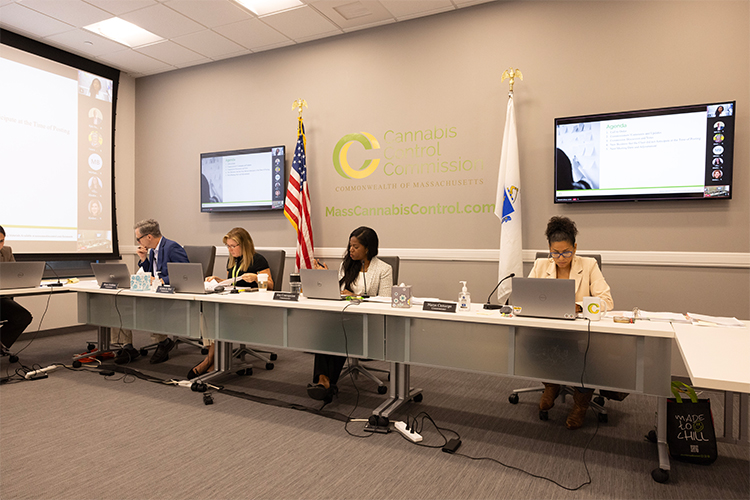News / Cannabis Control Commission Approves Historic Regulatory Changes to Implement Commonwealth’s Equity Reform Law
For Immediate Release
September 27, 2023
Contact
Tara Smith
Senior Press Secretary
617-549-1166
Tim Caputo
Press Secretary
774-525-1507
Press@CCCMass.com
Cannabis Control Commission Approves Historic Regulatory Changes to Implement Commonwealth’s Equity Reform Law
WORCESTER–Following five days of public meetings, the Cannabis Control Commission (Commission) on Friday, September 22, 2023 voted 3-1 to approve final changes to Massachusetts’ adult and medical use of marijuana regulations, including policies that will implement the agency’s oversight of host community agreements (HCAs), new municipal equity requirements, and suitability reform, in accordance with Chapter 180 of the Acts of 2022, An Act Relative to Equity in the Cannabis Industry.
To get to this point, regulatory working groups, led by Commissioners and staff, participated in months of policy discussion and stakeholder engagement, then initially proposed draft regulations that were first approved by Commissioners in a 4-0 vote at their July 28 public meeting. The Commission then filed the draft with the Secretary of the Commonwealth in August, gathered written testimony, and held a public hearing for stakeholders to weigh in on the policy proposals on September 8, prior to the September 22 vote on final regulations.
“Commissioners and staff have worked tirelessly for months to revise our regulations—driving a transparent process and listening to feedback from diverse constituents, convening numerous public meetings, and making thoughtful changes,” said Acting Chair Ava Callender Concepcion. “I am grateful to our partners in the Legislature and in the Executive Branch for entrusting us with the authority to move the agency and industry forward and am proud of the final product that we will be filing with the Secretary of the Commonwealth.”
“I am thrilled that Massachusetts is one step closer to implementing important reforms that will ensure our legal industry includes full participation by communities that have been harmed by the War on Drugs,” said Commissioner Nurys Camargo. “These changes are a long time coming, but I am confident that these regulations will move the needle forward on equity and inclusion in our marketplace.”
“The Commission has done its part to write regulations that will ensure local contracts between municipalities and licensees comply with state law, and cities and towns prioritize equity as much as the Commonwealth does,” said Commissioner Kimberly Roy. “While Commissioners may not have been in agreement about every change in these final drafts, I am proud we are on our way to promulgating new policies in accordance with Chapter 180.”
“These new regulations will increase opportunities for all licensees to truly compete in this industry, and I am excited to see these new policies take effect,” said Commissioner Bruce Stebbins. “Massachusetts is now home to a $5 billion industry, and the time is now to ensure equity participants can participate meaningfully in all the regulated marketplace has to offer.”
Next, staff will finalize the policy changes discussed last week and file the regulations with the Secretary of the Commonwealth toward promulgation no later than November 9, in compliance with Chapter 180. They include:
HCAs
- New Commission authority to:
- Review, approve, and certify HCAs, and develop a model contract;
- Deem an HCA provision invalid or unenforceable, or voidable; and
- Issue sanctions against a host community that is noncompliant with HCA regulatory requirements, abstain from considering new license applications in that host community, or publish a list of communities that are out of compliance.
- Starting no later than March 1, 2024, the Commission will enforce the requirement that License Applicants and/or Licensees and host municipalities reach and adhere to an HCA that complies with state law, or agree to a compliant waiver;
- To be considered compliant, any conditions set in an HCA must be reasonable. Some conditions that are presumed reasonable, include those that are:
- Required under local rules, regulations, ordinances, or bylaws;
- Deemed necessary to ensure public safety and proposed by the host community’s chief law enforcement authority and/or fire protection chief, to include a detailed explanation of necessity;
- Deemed necessary to ensure public health and proposed by the host community’s chief public health authority, to include a detailed explanation of necessity;
- A local requirement customarily imposed by the host community on other, non-cannabis businesses operating in the municipality;
- Not in conflict with other laws; or
- Otherwise deemed reasonable by the Commission.
- To be considered compliant, any conditions set in an HCA must be reasonable. Some conditions that are presumed reasonable, include those that are:
- New provisions specifying the stipulations between the HCA and the License Applicant and/or Licensee and a set timeline for host communities to transmit an invoice of claimed impact fees to the Licensee who is subject to the HCA;
- Each impact fee invoice must include specific line items for cost and purpose of each good or service as well as their relation to the operation of the Licensee.
- The host community shall not attempt to collect impact fees relating to any operations occurring prior to the date a licensee is granted a final license by the Commission; and
- The host community shall not attempt to collect impact fees from any Licensee that has held a final license for more than nine years.
- Each impact fee invoice must include specific line items for cost and purpose of each good or service as well as their relation to the operation of the Licensee.
- Permission for the host community and License Applicant and/or Licensee to include HCA terms that they agree to bring HCA-related disputes before a private mediator retained by the parties, without compelling parties to participate;
- Prohibitions on certain HCA provisions, terms, conditions, or clauses, including:
- A promise to make future monetary payment, in-kind contribution, or charitable contributions, whether explicit or implicit;
- Requiring a License Applicant or Licensee to make upfront payments as a condition for operating in the host community;
- Obligating a Licensee to set aside money in an escrow, bond, or other similar account for a host community’s use or purpose;
- Imposing legal, overtime, or administrative costs or any costs other than a Community Impact Fee on a Licensee with the exception of tax obligations and routine, generally occurring fees;
- Inducements to negotiate or execute an HCA;
- Requiring that the Community Impact Fee be a certain percentage of the Licensee’s total or gross sales as a term or condition of an HCA, or demanding the fee exceed three percent of the licensee’s gross sales;
- Discouraging any party from bringing a civil cause of action or other legal challenge relative to an HCA or to an individual term or provision of an HCA; and
- Waiving away a Licensee’s ability to dispute whether the impact fees alleged by a host community are reasonably related to the costs imposed on their operations;
- A set timeline (a maximum of 90 days) and process for the Commission to complete its review of an HCA upon receiving it from a License Applicant and/or Licensee—which may be extended 90 days on receiving an amended HCA;
- The ability of Licensees to access equitable relief if a municipality decides to no longer continue as their host community;
- The Commission may give the impacted Licensee additional time to receive the approval of the city/town for a compliant HCA or make a change of location, waive fees, institute procedures to wind down licensee operations, or determine other equitable relief;
- Allowing interested parties to file complaints alleging noncompliance with HCA requirements with the Commission and allowing Licensees or License Applicants to bring a private breach of contract action in a court of competent jurisdiction.
Municipal Equity
- Authorizing Licensees to satisfy, in part, existing requirements to submit a Plan to Positively Impact Disproportionately Harmed People to the Commission by donating to the Cannabis Social Equity Trust Fund that is administered by the Executive Office of Economic Development in collaboration with the Cannabis Social Equity Advisory Board;
- Expansion of the Commission’s pre-certification process, which is currently available for delivery or social consumption licenses, to all license types, thereby enabling Certified Economic Empowerment Priority Applicants and Social Equity Program Participants to demonstrate to a prospective host city or town their propensity to open any licensed cannabis business;
- A new pre-verification and verification process available to prospective license applicants who may later qualify as a Social Equity Business under Chapter 180 to become eligible for consideration as part of host communities’ equity efforts at the local licensing level;
- Eliminating existing administrative burdens on License Applicants and Licensees who qualify as Social Equity Businesses and businesses held by majority ownership of Social Equity Program Participants and/or Economic Empowerment Priority Applicants;
- To increase transparency into municipal licensing frameworks and available HCAs, a requirement that cities and towns publish information about their local licensing process in a conspicuous place and online, and create a standard evaluation form to ensure businesses have clarity about why licenses are issued to certain entities over others;
- Setting specific standards for host communities during HCA negotiations with verified or pre-verified Social Equity Businesses and License Applicants, including:
- The ability to waive or reduce fees such as CIFs, zoning, and occupancy fees;
- Set numbers of conferences with equity parties and the requirement of providing a certified interpreter to assist non-English speakers;
- The ability of an equity party to propose an amendment to, or seek cancellation of, an HCA within 30 days of execution;
- Prohibition against the use of undue influence, duress, coercion, intimidation, threats, or any strong-arm tactics to negotiate an HCA with an equity party, or compelling any equity party to sign the contract;
- Requiring that host communities with saturated licensing caps reserve for equity businesses at least one, and as many as 50% of any expanded license opportunities; and
- Authorizing the Commission, starting March 1, 2025, to fine cities and towns that are found to be out of compliance with the Commission’s municipal equity regulations, and deposit those fines into the Cannabis Social Equity Trust Fund.
Suitability
- In accordance with Chapter 180, eliminating previously existing disqualifiers that prevented individuals with certain criminal backgrounds from employment in the legal industry as Registered Agents for Marijuana Establishments and Medical Marijuana Treatment Centers, with exceptions for Independent Testing Laboratory Agents and license owners.
- As part of the final regulations, Commissioners also extended the timeframe for reviewing past actions of certain agents that could lead to a negative suitability determination. This review or lookback period has been extended from five years to an indefinite duration for issues where an agent’s prior actions posed or would likely pose a risk to the public health, safety, or welfare, and those actions relate or would likely relate to the operation of a Marijuana Establishment or Medical Marijuana Treatment Center.
Additional information is available by visiting MassCannabisControl.com, by contacting the Commission by phone (774-415-0200) or email (Commission@CCCMass.com), or following the agency on Facebook and X.
###
Get Notified
Subscribe for updates from the Cannabis Control Commission.



